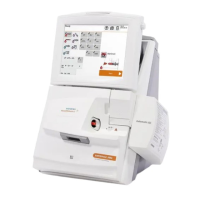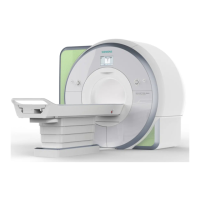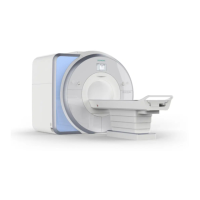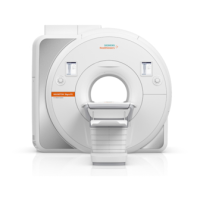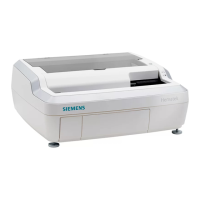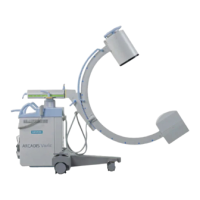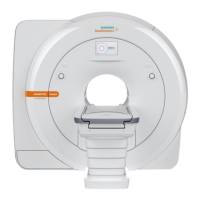
Do you have a question about the Siemens Healthineers MAGNETOM Sempra and is the answer not in the manual?
| Magnetic Field Strength | 1.5 T |
|---|---|
| Magnet Type | Superconducting |
| Gradient Strength | 45 mT/m |
| Slew Rate | 200 T/m/s |
| Number of Channels | 32 |
| Patient Table Weight Capacity | 250 kg |
| Patient Weight Limit | 250 kg |
| Weight | 4500 kg |
| Patient Bore Diameter | 60 cm |
| Type | MRI System |
| System Type | 1.5T MRI |
| Cooling System | Helium-based |
Describes the structure and volumes of the complete operator manual for readability.
This manual serves as a supplement to the main MR system operator manual.
Lists product names and their corresponding shorter designations used within the document.
Emphasizes adherence to all safety information from valid operator manuals.
Details hazards related to damaged RF coils and patient burns.
Explains how cables form loops, become hot, and safety related to unconnected RF coils.
Highlights safety during quality measurement, especially regarding patient injury.
Covers risks associated with measurement phantoms, including fluid spills and fire hazards.
Provides instructions for handling spilled phantom fluids and first aid measures.
Introduces RF coils, their types (transceiver, receiver), and basic principles.
Shows the location and identifies the coil sockets on the patient table.
Provides instructions and notes on correctly attaching RF coils to the system.
Details safe handling practices for RF coils to prevent electric shock and damage.
Guides on how to properly store RF coils and accessories using a coil cart.
Covers general principles and precautions for positioning patients on the table.
Explains the mechanisms and steps for securing coils using table straps.
Details positioning the patient's head using back-of-head support when no head coil is used.
Describes how to position the patient's head in the Head First orientation.
Describes how to position the patient's feet in the Feet First orientation.
Introduces the importance of quality measurements for RF coil verification.
Explains the process and use of measurement phantoms for quality checks.
Step-by-step guide on how to perform quality assurance using the system software.
Details the function, configuration, and application of the Body coil.
Procedure for performing quality measurement for the Body coil.
Describes the Head/Neck 16 coil, its use, and components.
Instructions for positioning and using the Head/Neck 16 coil.
Procedure for performing quality measurement for the Head/Neck 16 coil.
Describes the Head/Neck 10 coil, its use, and components.
Instructions for positioning and using the Head/Neck 10 coil.
Procedure for performing quality measurement for the Head/Neck 10 coil.
Describes the Spine 18 coil, its application, and components.
Instructions for positioning and using the Spine 18 coil.
Procedure for performing quality measurement for the Spine 18 coil.
Describes the Body 6 coil, its use for different body regions and orientations.
Instructions for positioning and using the Body 6 coil.
Procedure for performing quality measurement for the Body 6 coil.
Describes the Breast 4 coil, its use for examining female patients.
Instructions for positioning and using the Breast 4 coil.
Procedure for performing quality measurement for the Breast 4 coil.
Information on the 4 Ch BI Breast coil.
Describes the Shoulder Small/Large 6 coil and its components.
Instructions for positioning and using the Shoulder Small/Large 6 coil.
Procedure for performing quality measurement for the Shoulder Small/Large 6 coil.
Describes the Wrist 8 coil, its use for hands and fingers, and components.
Instructions for positioning and using the Wrist 8 coil.
Procedure for performing quality measurement for the Wrist 8 coil.
Describes the Extremity 12 coil for knee examinations and its components.
Instructions for positioning and using the Extremity 12 coil.
Procedure for performing quality measurement for the Extremity 12 coil.
Describes the Foot/Ankle 10 coil for examining feet and ankles and its components.
Instructions for positioning and using the Foot/Ankle 10 coil.
Procedure for performing quality measurement for the Foot/Ankle 10 coil.
Explains the purpose and components of the Flex Coil Interface.
Details how to connect the Flex Coil Interface to the patient table.
Describes the Flex Small/Large 4 coil, its sizes, and components.
Instructions for positioning and using the Flex Small/Large 4 coil.
Procedure for performing quality measurement for the Flex Small/Large 4 coil.
Describes the Special Purpose 4 coil for examining small body regions.
Instructions for positioning and using the Special Purpose 4 coil.
Procedure for performing quality measurement for the Special Purpose 4 coil.
Provides instructions for cleaning RF coils and positioning aids using approved solutions.
Lists standard accessories included for patient positioning.
Illustrates various cushions and positioning aids for patient comfort and support.
Shows different types of positioning aids like wedges, rolls, and cushions.
Lists specific positioning aids available for different types of coils.
Details accessories used for quality assurance, including measurement phantoms.
Lists and describes the different measurement phantoms used for quality assurance.
Shows various phantom holders used for positioning phantoms during quality measurements.
